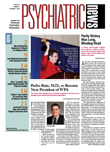Only 43 percent of the 5 million Americans connected to the armed forces are service members. The rest—almost 3 million people—are members of their families.
All are affected by loneliness and uncertainty when their loved ones are sent off to war and by constant media reminders of the danger they face while away, said Robert Ursano, M.D., chair of psychiatry at the Uniformed Services University of the Health Sciences (USUHS) in Bethesda, Md. “They are at risk at all points in the deployment cycle—before, during, and after their time in a war zone and again when they return to the fighting.”
To date, more than 4,100 service members have died in the Iraq war, and more than 30,000 have been wounded, numbers that mask a heavy toll on military families.
“Most families are strong and most military kids function at the same levels as civilian children, but we see more distress and marital problems in families of deployed troops,” said Stephen Cozza, M.D., associate director of the Center for the Study of Traumatic Stress and a professor of psychiatry at USUHS. Ursano and Cozza spoke at a conference on traumatic spectrum disorders held on the National Institutes of Health campus in Bethesda in October.
About 73 percent of all single military parents are mothers, and depression rates have been observed to rise among deployed single mothers, with inevitable effects on their capacity to care for their children, he said.
Wives who were pregnant when their husbands were deployed felt greater conflicts about pregnancy than women without deployed spouses. However, community support, especially from on-base sources, helped these women, according to a study in the June Research in Nursing and Health.
Stress has a “corrosive” impact on families once a soldier returns, said Cozza. Combat exposure increases rates of poasttraumatic stress disorder (PTSD), and PTSD leads to permissive parenting because of avoidance or numbing. These troops may experience anger and depression, raising the chance for domestic violence. The postconcussive syndrome experienced by soldiers with traumatic brain injuries—which may include PTSD—may produce changes in personality and increases in impulsivity that can last for months and can affect parenting too.
Despite the need, there is little or no research on the effects on children and families of deployment and injury in wartime, Cozza told the meeting. Much of what is known is based on qualitative or anecdotal sources.
“We need assessments of the effects on children of multiple deployments, as well as parental injury, psychological illness, and death on different age groups and developmental categories,” he said.
A joint study by Walter Reed Army Institute of Research and the Brooke Army Medical Center in San Antonio is now looking at children of wounded soldiers. However, there is still little information on how to support the families of these troops, said Cozza.
An abstract of “The Relationship of Military Imposed Marital Separations on Maternal Acceptance of Pregnancy” is posted at<www3.interscience.wiley.com/journal/117891890/abstract?CRETRY=1&SRETRY=0>.▪
